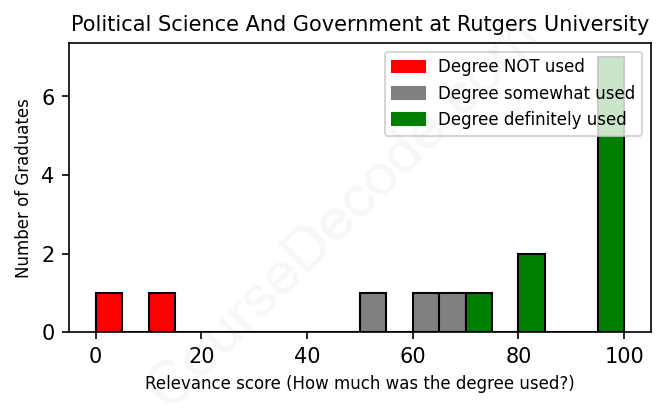
First, some facts. Of the Political Science And Government graduates from Rutgers University we've analyzed , here's how many have used (or NOT used) their degree in their career:

These are estimates based on AI analysis of 15 LinkedIn profiles (see below).
The verdict? Above average. Overall, with an average relevance score of 75%, Political Science And Government graduates from Rutgers University have a higher likelihood (+8%) of finding work in this field compared to the average graduate across all fields:
And for comparison, here's the chart for all profiles we've looked at across all degrees.
Also, after graduating, only 26% of these graduates have pursued further education other than another Bachelor's degree (such as a Masters degree or other), compared to the average across all profiles of 35%. This suggests a Bachelors degree is enough for most Political Science And Government graduates, and it's normal to look for work straight after graduation.
See the details:
|
Relevance score: 81% We think this person has gone into a career highly relevant to their degree. We think this person has gone into a career highly relevant to their degree.
DEGREE INFOGraduated in 2012 from Rutgers University with a Bachelors in Political Science And Government. No other secondary education since. JOB HISTORY SINCE GRADUATIONLegal Assistant Hall & Associates Jan 2014 - Oct 2015 Senior Legal Assistant  Moore Ingram Johnson & Steele Oct 2015 - Sep 2017 Legal Assistant  UBS Sep 2017 - Jul 2022 Authorized Officer & Team Lead of Legal Execution Services, Americas  UBS Nov 2021 - Jul 2022 Associate Officer and Senior Legal Assistant, Mutual Funds  AllianceBernstein Jul 2022 - Present Associate Officer and Senior Legal Assistant, Alternatives Legal  AllianceBernstein Jan 2023 - Present ABOUTNo information provided. |
The top 10 most common jobs done by the graduates we've analyzed (ranked most common to least) are:
People who've graduated with a degree in Political Science and Government from Rutgers University seem to have carved out a pretty diverse range of careers, but there’s a noticeable trend toward legal and government positions. Many of them have taken roles like legal assistants, investigators, and various positions within the state government, which directly relate to what they studied. For instance, a lot of graduates found jobs as investigators in the New Jersey Department of Banking and Insurance, utilizing their understanding of regulations and policies, which shows a strong connection to their education. Additionally, many roles in the legal field—like paralegals, legal interns, and law clerks—also align closely with political science since they involve legal procedures, politics, and governance.
On the flip side, there are also graduates who have ended up in positions that aren't really connected to political science at all. For instance, jobs in sales, hospitality, or administrative roles don't really require the same kind of political analysis or governance knowledge. It's clear that while there are strong connections for many in their political science careers, not everyone has landed in a field that fully utilizes the skills from their degree. So, in summary, while many Political Science grads from Rutgers have found relevant and related jobs in law and government, there’s also a fair share who are in roles where their degree might not play a significant part in their day-to-day work.
Here is a visual representation of the most common words in job titles for Political Science And Government graduates (this is across all Political Science And Government graduates we've analyzed, not just those who went to Rutgers University):

The career trajectories for graduates of Political Science and Government from Rutgers University paint a mixed picture. Many graduates initially find themselves taking jobs related to law and government, such as legal assistants, investigators, and legislative aides. For example, those who graduated in the early 2010s often landed positions in state departments or as legal assistants, suggesting a clear path into the legal field or public service. Fast forward five to ten years, and most of these individuals seem to move up the ranks in legal or governmental roles, becoming supervisors, associate attorneys, or even directors of policy and external affairs. However, there are also cases where graduates have veered off this path, ending up in less directly related roles in operations or event coordination, particularly from more recent classes.
It's clear that a significant number of Rutgers Political Science graduates have secured roles that are somewhat aligned with their field of study, particularly in the legal and governmental sectors. That said, not everyone has followed a straightforward path, with some shifting to unrelated fields or roles that don’t fully utilize their political science background. Overall, while there are several examples of successful and relevant career trajectories in politics, law, and public service, there’s also a notable portion of alumni whose careers diverged from the typical expectations of their degree. So, if you're thinking about studying Political Science, it might be worth considering how you can leverage that degree into a career that you're passionate about, even if it might not directly align with traditional roles in government or law.
Honestly, a Bachelor’s degree in Political Science and Government can be a mixed bag, and at Rutgers, it falls somewhere in the middle in terms of difficulty. You’ll definitely have to dive into a lot of readings, research, and writing, which can get overwhelming if you're not used to it. Some classes might be pretty engaging and straightforward, especially if you’re into current events and theory, but others can feel a bit heavy with theory and analysis. It’s not the easiest route out there, but if you’re passionate about the subject, it can also be really rewarding and interesting. So, if you’re ready to put in the work and keep up with discussions about politics and policy, you’ll probably find it manageable!
Most commonly, in the LinkedIn profiles we've looked at, it takes people 4 years to finish a Bachelor degree in Political Science And Government.
Looking at these graduates from Rutgers with political science and government degrees, it seems like some are doing pretty well while others might be in positions that don't pay too much. For example, those working in government positions like investigators or policy coordinators generally have decent salaries, especially as they move up in their roles. The legal assistants and paralegals typically earn lower salaries initially, but those who climbed the legal ladder seem to be making better money now. On the flip side, some recent grads are stuck in entry-level jobs or internships, which usually don’t pay that well. Overall, it looks like the ones who stuck with legal or governmental paths are likely making decent money now, while others might still be figuring it out.
Here is a visual representation of the most common words seen in the "about" section of LinkedIn profiles who have a Bachelor degree in Political Science And Government (this is across all Political Science And Government graduates we've analyzed, not just those who went to Rutgers University). This may or may not be useful:

Here are all colleges offering a Bachelor degree in Political Science And Government (ordered by the average relevance score of their Political Science And Government graduates, best to worst) where we have analyzed at least 10 of their graduates: